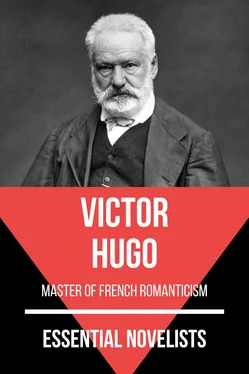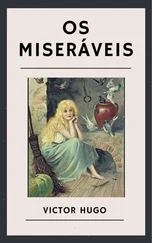“That is well,” said M. Madeleine.
And he dismissed Javert with a wave of the hand.
Javert did not withdraw.
“Excuse me, Mr. Mayor,” said he.
“What is it now?” demanded M. Madeleine.
“Mr. Mayor, there is still something of which I must remind you.”
“What is it?”
“That I must be dismissed.”
M. Madeleine rose.
“Javert, you are a man of honor, and I esteem you. You exaggerate your fault. Moreover, this is an offence which concerns me. Javert, you deserve promotion instead of degradation. I wish you to retain your post.”
Javert gazed at M. Madeleine with his candid eyes, in whose depths his not very enlightened but pure and rigid conscience seemed visible, and said in a tranquil voice:—
“Mr. Mayor, I cannot grant you that.”
“I repeat,” replied M. Madeleine, “that the matter concerns me.”
But Javert, heeding his own thought only, continued:—
“So far as exaggeration is concerned, I am not exaggerating. This is the way I reason: I have suspected you unjustly. That is nothing. It is our right to cherish suspicion, although suspicion directed above ourselves is an abuse. But without proofs, in a fit of rage, with the object of wreaking my vengeance, I have denounced you as a convict, you, a respectable man, a mayor, a magistrate! That is serious, very serious. I have insulted authority in your person, I, an agent of the authorities! If one of my subordinates had done what I have done, I should have declared him unworthy of the service, and have expelled him. Well? Stop, Mr. Mayor; one word more. I have often been severe in the course of my life towards others. That is just. I have done well. Now, if I were not severe towards myself, all the justice that I have done would become injustice. Ought I to spare myself more than others? No! What! I should be good for nothing but to chastise others, and not myself! Why, I should be a blackguard! Those who say, ‘That blackguard of a Javert!’ would be in the right. Mr. Mayor, I do not desire that you should treat me kindly; your kindness roused sufficient bad blood in me when it was directed to others. I want none of it for myself. The kindness which consists in upholding a woman of the town against a citizen, the police agent against the mayor, the man who is down against the man who is up in the world, is what I call false kindness. That is the sort of kindness which disorganizes society. Good God! it is very easy to be kind; the difficulty lies in being just. Come! if you had been what I thought you, I should not have been kind to you, not I! You would have seen! Mr. Mayor, I must treat myself as I would treat any other man. When I have subdued malefactors, when I have proceeded with vigor against rascals, I have often said to myself, ‘If you flinch, if I ever catch you in fault, you may rest at your ease!’ I have flinched, I have caught myself in a fault. So much the worse! Come, discharged, cashiered, expelled! That is well. I have arms. I will till the soil; it makes no difference to me. Mr. Mayor, the good of the service demands an example. I simply require the discharge of Inspector Javert.”
All this was uttered in a proud, humble, despairing, yet convinced tone, which lent indescribable grandeur to this singular, honest man.
“We shall see,” said M. Madeleine.
And he offered him his hand.
Javert recoiled, and said in a wild voice:—
“Excuse me, Mr. Mayor, but this must not be. A mayor does not offer his hand to a police spy.”
He added between his teeth:—
“A police spy, yes; from the moment when I have misused the police. I am no more than a police spy.”
Then he bowed profoundly, and directed his steps towards the door.
There he wheeled round, and with eyes still downcast:—
“Mr. Mayor,” he said, “I shall continue to serve until I am superseded.”
He withdrew. M. Madeleine remained thoughtfully listening to the firm, sure step, which died away on the pavement of the corridor.
Book Seventh
The Champmathieu Affair
––––––––
Chapter I
Sister Simplice
––––––––

THE INCIDENTS THE READER is about to peruse were not all known at M. sur M. But the small portion of them which became known left such a memory in that town that a serious gap would exist in this book if we did not narrate them in their most minute details. Among these details the reader will encounter two or three improbable circumstances, which we preserve out of respect for the truth.
On the afternoon following the visit of Javert, M. Madeleine went to see Fantine according to his wont.
Before entering Fantine’s room, he had Sister Simplice summoned.
The two nuns who performed the services of nurse in the infirmary, Lazariste ladies, like all sisters of charity, bore the names of Sister Perpétue and Sister Simplice.
Sister Perpétue was an ordinary villager, a sister of charity in a coarse style, who had entered the service of God as one enters any other service. She was a nun as other women are cooks. This type is not so very rare. The monastic orders gladly accept this heavy peasant earthenware, which is easily fashioned into a Capuchin or an Ursuline. These rustics are utilized for the rough work of devotion. The transition from a drover to a Carmelite is not in the least violent; the one turns into the other without much effort; the fund of ignorance common to the village and the cloister is a preparation ready at hand, and places the boor at once on the same footing as the monk: a little more amplitude in the smock, and it becomes a frock. Sister Perpétue was a robust nun from Marines near Pontoise, who chattered her patois, droned, grumbled, sugared the potion according to the bigotry or the hypocrisy of the invalid, treated her patients abruptly, roughly, was crabbed with the dying, almost flung God in their faces, stoned their death agony with prayers mumbled in a rage; was bold, honest, and ruddy.
Sister Simplice was white, with a waxen pallor. Beside Sister Perpétue, she was the taper beside the candle. Vincent de Paul has divinely traced the features of the Sister of Charity in these admirable words, in which he mingles as much freedom as servitude: “They shall have for their convent only the house of the sick; for cell only a hired room; for chapel only their parish church; for cloister only the streets of the town and the wards of the hospitals; for enclosure only obedience; for gratings only the fear of God; for veil only modesty.” This ideal was realized in the living person of Sister Simplice: she had never been young, and it seemed as though she would never grow old. No one could have told Sister Simplice’s age. She was a person—we dare not say a woman—who was gentle, austere, well-bred, cold, and who had never lied. She was so gentle that she appeared fragile; but she was more solid than granite. She touched the unhappy with fingers that were charmingly pure and fine. There was, so to speak, silence in her speech; she said just what was necessary, and she possessed a tone of voice which would have equally edified a confessional or enchanted a drawing-room. This delicacy accommodated itself to the serge gown, finding in this harsh contact a continual reminder of heaven and of God. Let us emphasize one detail. Never to have lied, never to have said, for any interest whatever, even in indifference, any single thing which was not the truth, the sacred truth, was Sister Simplice’s distinctive trait; it was the accent of her virtue. She was almost renowned in the congregation for this imperturbable veracity. The Abbé Sicard speaks of Sister Simplice in a letter to the deaf-mute Massieu. However pure and sincere we may be, we all bear upon our candor the crack of the little, innocent lie. She did not. Little lie, innocent lie—does such a thing exist? To lie is the absolute form of evil. To lie a little is not possible: he who lies, lies the whole lie. To lie is the very face of the demon. Satan has two names; he is called Satan and Lying. That is what she thought; and as she thought, so she did. The result was the whiteness which we have mentioned—a whiteness which covered even her lips and her eyes with radiance. Her smile was white, her glance was white. There was not a single spider’s web, not a grain of dust, on the glass window of that conscience. On entering the order of Saint Vincent de Paul, she had taken the name of Simplice by special choice. Simplice of Sicily, as we know, is the saint who preferred to allow both her breasts to be torn off rather than to say that she had been born at Segesta when she had been born at Syracuse—a lie which would have saved her. This patron saint suited this soul.
Читать дальше













